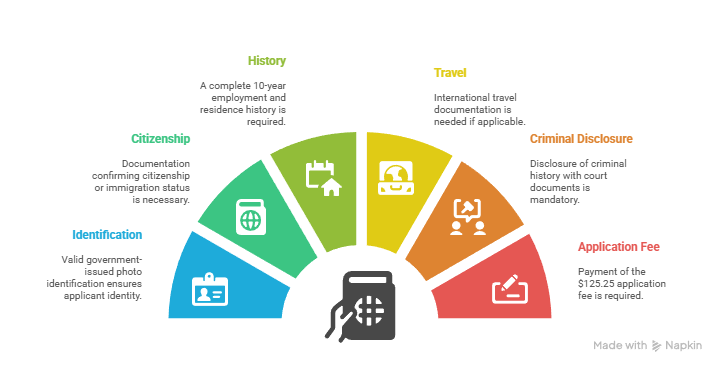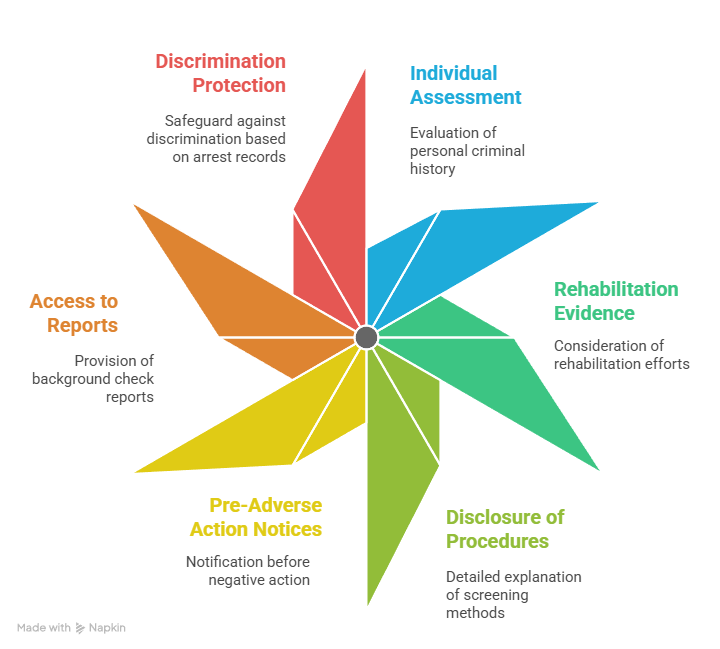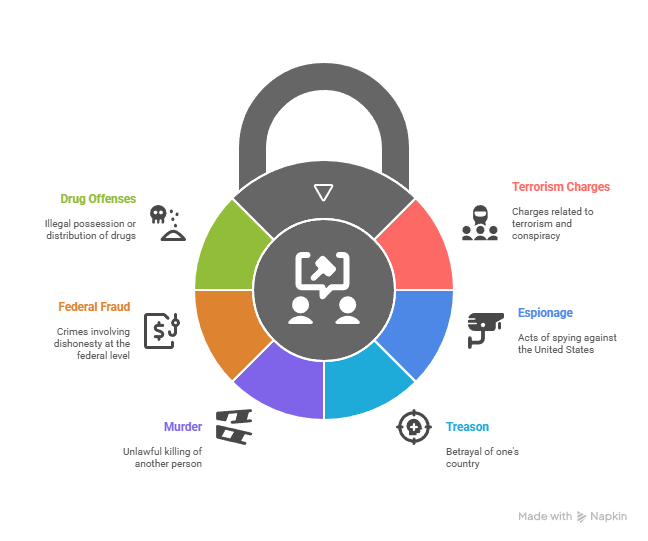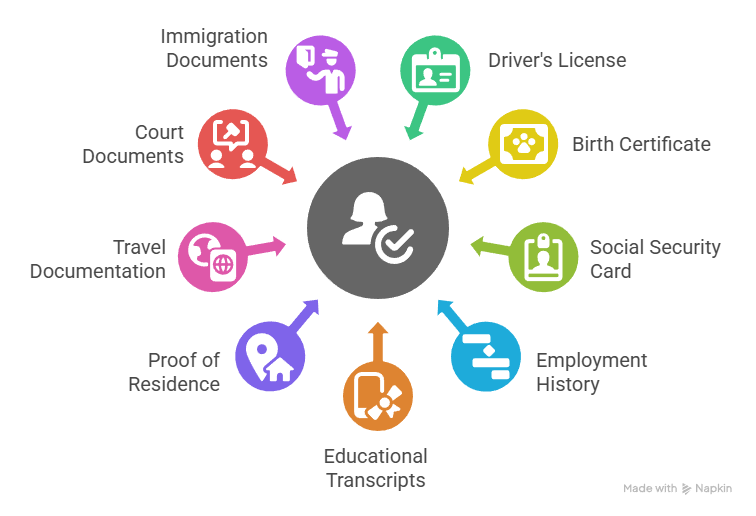California port worker background screening requires federal TWIC card approval through TSA security investigations. TWIC stands for Transportation Worker Identification Credential, a biometric security card mandatory for all workers accessing secure maritime facilities. These screenings examine criminal history, immigration status, and security threats to ensure port safety compliance.
Key Takeaways
- TWIC card mandatory: All California port workers need Transportation Worker Identification Credentials before starting employment at secure port facilities.
- Multi-agency screening: Background checks involve TSA, FBI, and immigration databases for comprehensive security threat assessment and employment verification.
- 2-8 week processing: Complete background screening typically requires 2-8 weeks, with expedited options available for urgent employment needs.
- Specific disqualifiers: Certain felonies, terrorism charges, and immigration violations can permanently or temporarily bar port employment opportunities.
- California protections: State employment laws provide appeal rights and individualized assessment requirements for criminal history evaluation.
- Ongoing compliance: Port workers must maintain clean records and may face periodic re-screening throughout their employment careers.
TWIC Card Requirements and Application Process
TWIC cards serve as the foundation for California port worker background screening. These cards prove identity and security clearance. They allow unescorted access to secure port areas. All port workers must obtain valid TWIC credentials before employment.
California operates major ports including Los Angeles and Long Beach. These ports handle over 40% of US containerized imports. Federal security laws require background screening for all port workers. The Maritime Transportation Security Act sets these security standards.
The application process begins with online pre-enrollment. Workers complete detailed personal history forms. They schedule in-person appointments at enrollment centers. Required documentation must be gathered before appointments.
TWIC applications require extensive personal information disclosure. Workers provide complete employment history for ten years. Address history must be accurate and complete. International travel records need detailed documentation. Any criminal history requires full disclosure.
TWIC Application Requirements:

- Valid government-issued photo identification
- Citizenship or immigration status documentation
- Complete 10-year employment and residence history
- International travel documentation if applicable
- Criminal history disclosure with court documents
- Payment of $125.25 application fee
The screening examines criminal history thoroughly. Federal, state, and local databases are searched. Immigration status receives verification through federal systems. Credit history may be reviewed for certain positions. Employment history gets verified with previous employers.
Biometric Collection and Identity Verification
In-person enrollment appointments involve biometric data collection. Digital fingerprints are captured electronically. Facial photographs are taken for card production. Identity documents undergo thorough verification. Any discrepancies require additional documentation.
Enrollment centers use advanced technology for data capture. Fingerprint quality must meet federal standards. Poor quality prints require recapture. Workers with damaged fingerprints may need alternative procedures.
The biometric data links to federal databases immediately. This enables real-time identity verification. Duplicate applications are prevented through this system. Previous TWIC applications are identified automatically.
Processing Timeline and Status Monitoring
Standard TWIC processing takes 2-4 weeks after enrollment. Complex cases may require 6-8 weeks for completion. Expedited processing reduces time to 5-10 business days. This option costs an additional $60 fee.
Workers receive tracking numbers during enrollment appointments. Online status monitoring shows application progress. Email notifications provide processing updates. Workers can contact customer service for status inquiries.
Processing delays often result from incomplete information. Additional documentation requests extend timelines. Workers should respond quickly to information requests. This prevents unnecessary processing delays.
Federal Security Requirements and California State Protections
Port facilities are critical infrastructure locations. They need strict security measures to prevent threats. All workers with facility access must pass comprehensive background screening. This includes temporary workers and contractors.
The screening process combines federal and state requirements. TSA handles security threat assessments. Individual employers conduct additional employment verification. California labor laws add worker protections to the process.
California has additional background check requirements beyond TWIC standards. The Fair Employment and Housing Act provides worker protections. State consumer privacy laws govern screening procedures. These rules require careful employer compliance.
California's "ban the box" law limits criminal history inquiries. Employers cannot ask about convictions until conditional job offers. They must conduct individualized assessments of criminal records. Job relevance must be demonstrated for exclusions.
State investigative consumer reporting laws are strict. They require detailed disclosure forms. Written consent must be obtained. Specific adverse action procedures must be followed. Violations carry significant penalties for employers.
Key California Worker Protections:

- Individual assessment requirements for criminal history
- Consideration of rehabilitation evidence and education completion
- Detailed written disclosure of screening scope and procedures
- Pre-adverse action notices with opportunity for response
- Access to background reports and dispute resolution procedures
- Protection from discrimination based on arrest records without conviction
Port employers must balance federal security requirements with state worker protections. This often requires legal consultation for compliance. Screening practices must meet both security needs and California employment standards.
Fair Credit Reporting Act Rights
Federal FCRA requirements apply to all California port worker screening. Workers have rights to know when background checks occur. They can request copies of all reports obtained. Dispute procedures exist for inaccurate information.
Employers must provide clear disclosures before screening begins. Written authorization is required for background investigations. Pre-adverse action notices must include report copies. Workers get time to respond before final decisions.
FCRA violations carry significant penalties for employers. Workers can pursue statutory damages for violations. Actual damages may be recovered in court. Attorney fees are available for successful FCRA claims.
Types of Background Screening for Port Workers
California port worker background screening includes several screening types. Each type evaluates different risk factors. Understanding these helps workers prepare properly. The comprehensive nature reflects high security needs.
Criminal history checks form the largest screening component. They examine federal, state, and local records. Immigration verification ensures work authorization compliance. Credit reviews assess financial responsibility and security risks.
Employment history verification confirms previous work experience. Educational background checks validate claimed credentials. Professional license verification ensures current regulatory compliance. Reference checks evaluate character and work performance.
| Check Type | Review Period | Processing Time | Key Focus Areas |
| Criminal History | 10 years | 3-5 days | Felonies, violent crimes, drug offenses |
| Immigration Status | Complete history | 1-2 weeks | Work authorization, deportation history |
| Employment Verification | 10 years | 5-7 days | Job performance, eligibility verification |
Drug screening may be required for certain positions. Driving record checks apply to truck drivers. Financial background reviews examine credit history. Medical clearances may be needed for specific roles.
Some positions require enhanced security clearances beyond TWIC. These involve more detailed investigations. Additional interviews may be conducted. Character references receive thorough verification. The process takes longer for these positions.
Port positions requiring background screening include many job types. Longshoremen need these checks. Truck drivers must complete screening. Warehouse workers require clearance. Crane operators need approval. Security staff must pass checks. Administrative personnel with access need screening too.
Criminal Background Investigation Process
Criminal history screening examines comprehensive databases for disqualifying offenses. TSA maintains lists of permanently disqualifying crimes. These include terrorism, treason, espionage, and violent felonies. Interim disqualifying crimes create temporary employment bars.
California requires individualized criminal history assessments. Employers must consider the offensive nature and job relevance. Time has elapsed since conviction matters. Evidence of rehabilitation is important. Blanket exclusions based solely on criminal history are prohibited.
The screening covers federal, state, and local jurisdictions. Court records are reviewed thoroughly. Arrest records without convictions receive different treatment. Sealed or expunged records may still appear in federal databases.
TWIC checks examine multiple federal databases simultaneously. FBI criminal records get reviewed. Immigration databases are checked. Terrorist watch lists are searched. Identity verification occurs through document review.
Immigration and Work Authorization Verification
Immigration status verification ensures legal work authorization. This process examines citizenship documentation. Legal permanent resident status is verified. Work visa authorization is confirmed. Any immigration violations are identified.
E-Verify systems check work authorization status. Social Security Administration records are reviewed. Department of Homeland Security databases are searched. Inconsistencies trigger additional investigation requirements.
Workers must provide acceptable identity and work authorization documents. US passports satisfy both requirements. Driver's licenses plus Social Security cards work together. Green cards prove permanent resident work authorization.
Applicants must provide ten years of personal history. Employment records are required. Address history must be complete. Any criminal proceedings need disclosure. Civil legal issues require reporting. Missing information causes delays.
Common TWIC Disqualifying Factors
Certain criminal convictions create permanent employment barriers for California port workers. Federal regulations establish non-negotiable disqualifying factors. Some violations create temporary restrictions. Understanding these helps workers assess their eligibility.
Permanently disqualifying offenses include serious security-related crimes. Terrorism charges create lifetime bans. Espionage convictions prevent employment permanently. Treason charges result in permanent disqualification. Murder convictions create lifetime employment bars.
Financial crimes often disqualify applicants temporarily or permanently. Fraud convictions create barriers. Embezzlement charges prevent employment. Identity theft results in disqualification. Money laundering convictions create permanent bars.
Permanent Disqualifying Crimes:

- Terrorism and related conspiracy charges
- Espionage against the United States
- Treason or sedition convictions
- Murder in any degree
- Federal crimes involving dishonesty or fraud
- Unlawful possession or distribution of controlled substances
Interim Disqualifying Crimes (5-7 year bars):
- Assault with intent to murder
- Kidnapping or hostage taking
- Rape or aggravated sexual abuse
- Unlawful possession of firearms or explosives
- Extortion or armed robbery
- Distribution of controlled substances
Immigration violations can prevent TWIC approval. Deportation orders create barriers. Illegal presence may disqualify applicants. Immigration fraud prevents approval. False citizenship claims result in denial.
Financial and Credit-Related Disqualifiers
Credit history problems can affect port worker eligibility. Recent bankruptcy filings may indicate financial stress. This creates potential security vulnerabilities. Outstanding judgments suggest financial irresponsibility. Tax liens indicate legal compliance problems.
Significant debt levels may raise security concerns. Financial desperation could lead to security compromises. Identity theft history creates additional scrutiny. Credit fraud convictions often result in permanent disqualification.
California limits credit check usage in employment decisions. Employers must demonstrate job relevance for credit-based exclusions. Financial responsibility must relate directly to security requirements. Individual assessments are required for most positions.
California Consumer Privacy Act provides additional privacy protections for California workers. Personal information collection must be disclosed clearly. Workers have rights to know what information is collected. They can request deletion of certain personal data.
TWIC Appeals and Waiver Procedures
Workers facing TWIC disqualification can request administrative appeals. TSA provides established appeal procedures. Detailed documentation explaining circumstances is required. Evidence of rehabilitation strengthens appeal cases. Legal representation often improves success rates.
The appeals process requires specific forms and deadlines. Workers must respond within designated timeframes. Supporting documentation must be comprehensive. Character references help demonstrate rehabilitation. Community involvement evidence supports appeals.
Waiver applications allow consideration of mitigating circumstances. Stable employment history helps waiver requests. Community ties demonstrate reliability. Completion of rehabilitation programs supports applications. The review process extends timelines by 30-60 additional days.
Background screening companies must comply with CCPA requirements. They must provide privacy notices to California residents. Data retention policies must be clearly explained. Workers can request information about data sharing practices.
TWIC Card Costs and Financial Considerations
California port worker background screening costs vary based on screening scope. TWIC card fees represent the largest single expense. Additional employer screenings create supplementary costs. Understanding these expenses helps workers plan financially.
New TWIC applications currently cost $125.25 for most applicants. Renewal fees are the same amount every five years. Expedited processing costs an additional $60. This reduces processing time significantly. Some employers reimburse these costs as recruitment incentives.
Additional screening services may be required by specific employers. Employment verification typically costs $25-50 per applicant. Educational background checks range from $30-75. Professional reference investigations cost $40-100. These expenses are usually employer-paid.
| Service | Standard Cost | Expedited Cost | Employer Paid |
| TWIC Application | $125.25 | $185.25 | Sometimes |
| Employment Verification | $35 | N/A | Yes |
| Education Check | $50 | N/A | Yes |
| Credit Report | $25 | N/A | Yes |
Transportation costs for enrollment appointments affect many workers. California has enrollment centers in major cities. Rural workers may face significant travel expenses. Lost wages for appointment time create additional costs. Online pre-enrollment minimizes appointment duration.
Some positions require enhanced security clearances beyond TWIC. These investigations can cost $500-1,500 per person. Specialized positions may need psychological evaluations. Medical clearances add $100-300 in costs. Employers typically pay these enhanced screening expenses.
Hidden Costs and Expenses
Workers often overlook indirect costs associated with background screening. Time off work for appointments creates lost income. Travel expenses for distant enrollment centers add up. Document preparation may require fees for copies.
Expedited processing may be necessary for urgent employment needs. This doubles the standard TWIC application fee. Rush employment verification services cost premium rates. Last-minute document preparation increases expenses significantly.
Appeal and waiver processes create additional costs. Legal representation for complex cases ranges from $500-3,000. Document preparation for appeals requires time and expense. Multiple appeal attempts increase total costs substantially.
California employment laws provide comprehensive protections during screening processes. State consumer reporting laws require detailed disclosures. Workers must receive written notice of background checks. Explicit consent is required before screening begins.
Employer Reimbursement Policies
Many California port employers offer background check cost reimbursement. This helps attract qualified workers to the industry. Reimbursement policies vary significantly between companies. Some pay upfront costs directly to screening providers.
Large port employers often negotiate volume discounts with screening companies. These savings may be passed to workers through reimbursement programs. Union contracts frequently include background check cost coverage. Temporary agencies may advance costs and deduct from paychecks.
Workers should inquire about reimbursement policies during job interviews. Some employers require employment commitments in exchange for cost coverage. Leaving employment early may require repayment of screening costs.
The law creates new compliance obligations for employers. Privacy notices must be updated regularly. Data processing purposes must be clearly stated. Worker consent requirements may be enhanced under CCPA.
Preparation Strategies for Successful TWIC Screening
Thorough preparation significantly improves background check outcomes for California port workers. Organized documentation prevents processing delays. Understanding common problems allows proactive issue resolution. Workers who prepare properly navigate screening more efficiently.
Document collection should begin early in the job search process. Workers need comprehensive personal records covering ten years. Employment history requires specific dates and supervisor information. Address history must be complete and accurate.
Essential Document Checklist:

- Valid driver's license or state identification card
- Birth certificate or passport for citizenship verification
- Social Security card or IRS tax documents
- Complete employment history with dates and supervisor contacts
- Educational transcripts, diplomas, and professional certificates
- Proof of residence for each address in the past ten years
- International travel documentation including passport stamps
- Court documents for any criminal history
- Immigration documents if applicable
Workers should obtain personal credit reports before employer screening. This identifies potential issues requiring explanation. Criminal history records should be gathered from relevant jurisdictions. Any discrepancies should be resolved before formal screening begins.
Self-screening helps identify areas needing attention. Workers can address name discrepancies proactively. Address gaps can be documented with explanations. Employment date inconsistencies can be clarified with documentation.
Adverse action procedures must follow specific steps. Violations result in significant legal penalties for employers. Workers facing screening challenges should understand their rights under state and federal law.
Addressing Criminal History Concerns
Workers with criminal history should prepare comprehensive documentation. Court records provide official conviction information. Completion certificates from rehabilitation programs demonstrate positive change. Character references support rehabilitation claims.
California's individualized assessment requirements mean criminal history doesn't automatically disqualify workers. Well-documented rehabilitation efforts improve employment prospects. Stable work history since conviction helps applications. Community involvement demonstrates positive lifestyle changes.
Legal consultation may benefit workers with complex criminal histories. Attorneys can help prepare appeal documentation. They understand which factors influence employment decisions. Professional guidance improves success rates for challenging cases.
Workers should gather comprehensive documentation for any criminal history. Official court records provide accurate conviction information. Rehabilitation program completion certificates demonstrate positive change efforts. Character references from employers and community leaders support applications.
International Background Considerations
Workers with international backgrounds face additional documentation requirements. Passport records must be complete and accurate. Visa documentation proves legal entry and status. Extended foreign residence requires detailed explanation.
Foreign education credentials may need verification services. Professional licenses from other countries require validation. International employment history needs comprehensive documentation. Language barriers may complicate document preparation.
Workers should allow extra time for international background verification. Foreign records take longer to obtain and verify. Translation services may be required for foreign documents. Additional fees often apply to international verification services.
International travel history must be documented thoroughly. Passport stamps provide travel verification. Visa documentation proves legal entry. Extended foreign residence requires explanation. Business travel needs employer verification.
TWIC Card Renewal and Ongoing Compliance
TWIC cards require renewal every five years to maintain employment eligibility. The renewal process involves new background investigations. Workers must complete fresh applications with updated information. Renewal costs match initial application fees.
Renewal applications require current personal information updates. Employment history needs updating since last application. Address changes must be documented properly. Any new criminal history requires full disclosure.
The renewal process typically takes less time than initial applications. Existing records expedite database searches. Workers with clean records face fewer delays. Complex cases may require additional processing time.
TWIC Renewal Requirements:
- Updated personal history information covering five years since last application
- Current employment verification and contact information
- Documentation of any address changes or international travel
- Disclosure of any new criminal charges or convictions
- Payment of renewal fee and completion of biometric updates
Workers should begin renewal processes before card expiration. Expired TWIC cards prevent work in secure port areas. Processing delays can cause employment interruptions. Early renewal prevents these problems.
Ongoing Compliance and Record Maintenance
Port workers must maintain clean records throughout employment. New criminal charges can trigger TWIC revocation. Immigration status changes affect employment eligibility. Workers must report significant legal issues promptly.
Some employers conduct periodic background updates beyond TWIC requirements. These may include annual criminal history checks. Credit monitoring may continue throughout employment. Workers should maintain documentation for these reviews.
Record maintenance includes keeping personal documents current. Address changes should be reported to employers promptly. Legal name changes require document updates. Immigration status changes need immediate reporting.
California continues leading national trends in worker protection legislation. New laws regularly enhance privacy rights and screening procedures. Employment discrimination protections expand to cover additional categories. Criminal history assessment requirements become more detailed.
TWIC Card Replacement Procedures
Lost or damaged TWIC cards require replacement through TSA procedures. Workers must report card loss immediately. Temporary access may be restricted until replacement cards arrive. Replacement fees match new application costs.
Replacement applications require similar documentation to renewals. Identity verification receives extra scrutiny for security. Police reports may be required for stolen cards. Processing times match standard application timelines.
Workers should protect TWIC cards from damage and theft. Secure storage prevents unauthorized access. Regular inspection identifies damage early. Prompt replacement prevents employment disruptions.
Federal agencies work to balance security requirements with efficiency improvements. Streamlined processes reduce bureaucratic delays without compromising thoroughness. Enhanced database integration improves information accuracy. International cooperation agreements expand verification capabilities.
Conclusion
California port worker background screening through TWIC requirements ensures both security and employment opportunity protection. The comprehensive process examines criminal history, immigration status, and security threats while respecting worker rights under California employment laws. Success requires thorough preparation, complete documentation, and understanding of both federal TWIC requirements and state protections. As technology streamlines processes and regulations continue evolving, well-prepared workers will find the best opportunities in California's essential port logistics industry.
Frequently Asked Questions
How long does TWIC background screening take in California?
Standard TWIC background screening requires 2-6 weeks for processing. Complex cases may extend to 8 weeks. Expedited processing costs $60 extra and reduces time to 7-10 business days. Processing speed depends on application completeness and criminal history complexity.
What crimes disqualify workers from getting TWIC cards?
Permanently disqualifying crimes include terrorism, espionage, treason, and murder. Interim disqualifying offenses like drug trafficking and assault create 5-7 year employment bars. Immigration violations and significant financial problems can also prevent TWIC approval.
Do all California port workers need TWIC cards?
Yes, federal law requires TWIC cards for all workers with unescorted access to secure port areas. This includes longshoremen, truck drivers, warehouse workers, and administrative staff. Temporary workers and contractors must also complete TWIC screening.
How much does a TWIC card application cost?
New TWIC applications cost $125.25, with expedited processing available for an additional $60. TWIC renewal every five years costs the same amount. Some employers reimburse these costs as part of recruitment incentives.
Can I appeal a denied TWIC application?
Yes, TSA provides administrative appeal procedures for disputed TWIC denials. California employment laws also require individualized assessments for criminal history. Legal representation often improves appeal success rates for complex cases.
What documents do I need for the TWIC application?
Required documents include valid ID, birth certificate or passport, Social Security card, complete 10-year employment and address history, educational credentials, and international travel documentation. Criminal history court documents should be included if applicable.
How often must TWIC cards be renewed?
TWIC cards require renewal every five years with new background investigations. The renewal process involves updated personal history and fresh screening. Workers must maintain clean records throughout employment to avoid revocation.
Can non-citizens get TWIC cards for California port work?
Legal permanent residents and authorized workers can obtain TWIC cards for California port employment. Immigration status verification is part of the screening process. Undocumented workers cannot legally obtain TWIC cards or work in port positions.
Additional Resources
- Transportation Security Administration TWIC Program
https://www.tsa.gov/for-industry/twic - California Department of Fair Employment and Housing
https://www.dfeh.ca.gov/employment/ - Port of Los Angeles Employment Information
https://www.portoflosangeles.org/business/employment - Port of Long Beach Career Resources
https://www.polb.com/business/careers/ - Federal Trade Commission FCRA Guide
https://www.ftc.gov/legal-library/browse/statutes/fair-credit-reporting-act - California Attorney General CCPA Resources
https://oag.ca.gov/privacy/ccpa - U.S. Coast Guard Maritime Security Information
https://www.uscg.mil/Mariners/Maritime-Security/ - California Employment Development Department
https://www.edd.ca.gov/about_edd/coronavirus-2019/workers.htm
Still have questions?
Get in touch with our team today for a personalized demo and discover how our tailored volume pricing and packages can drive results for your business!
How useful was this page?*
Note: your comments are anonymous. We use them to improve the website. Do not include any personal details.
Visit our FCRA Compliance Tool or leave a message here if you need a response.
From the blog Explore the GCheck Content Hub

How Long Does a Background Check Take? A Complete 2025 Guide
13 Dec, 2023 • 14 min read
The Ultimate Background Check Guide
13 Dec, 2023 • 4 min read
The Ultimate Guide to Employment Background Checks
13 Dec, 2023 • 10 min readThe information provided in this article is for general informational and educational purposes only and should not be construed as legal advice or a substitute for consultation with qualified legal counsel. While we strive to ensure accuracy, employment screening laws and regulations—including but not limited to the Fair Credit Reporting Act (FCRA), Equal Employment Opportunity Commission (EEOC) guidelines, state and local ban-the-box laws, industry-specific requirements, and other applicable federal, state, and local statutes—are subject to frequent changes, varying interpretations, and jurisdiction-specific applications that may affect their implementation in your organization. Employers and screening decision-makers are solely responsible for ensuring their background check policies, procedures, and practices comply with all applicable laws and regulations relevant to their specific industry, location, and circumstances. We strongly recommend consulting with qualified employment law attorneys and compliance professionals before making hiring, tenant screening, or other decisions based on background check information.

